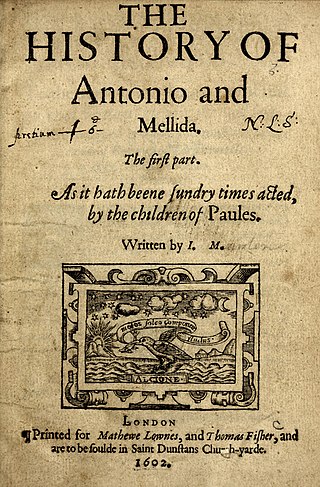Related Research Articles

English Renaissance theatre, also known as Renaissance English theatre and Elizabethan theatre, refers to the theatre of England between 1558 and 1642.
This article contains information about the literary events and publications of 1601.

John Marston was an English playwright, poet and satirist during the late Elizabethan and early Jacobean periods. His career as a writer lasted only a decade. His work is remembered for its energetic and often obscure style, its contributions to the development of a distinctively Jacobean style in poetry, and its idiosyncratic vocabulary.

The Curtain Theatre was an Elizabethan playhouse located in Hewett Street, Shoreditch, just outside the City of London. It opened in 1577, and continued staging plays until 1624.
The War of the Theatres is the name commonly applied to a controversy from the later Elizabethan theatre; Thomas Dekker termed it the Poetomachia.

A boy player was a male child or teenager who performed in Medieval and English Renaissance playing companies. Some boy players worked for adult companies and performed the female roles, since women were not allowed to perform on the English stage during this period. Others worked for children's companies in which all roles, not just the female ones, were played by boys.

Antonio and Mellida is a late Elizabethan play written by the satirist John Marston, usually dated to c. 1599.

The Malcontent is an early Jacobean stage play written by the dramatist and satirist John Marston ca. 1603. The play was one of Marston's most successful works. It is widely regarded as one of the most significant plays of the English Renaissance; an extensive body of scholarly research and critical commentary has accumulated around it.

The Dutch Courtesan is an early Jacobean stage play written by the dramatist and satirist John Marston circa 1604. It was performed by the Children of the Queen's Revels, one of the troupes of boy actors active at the time, in the Blackfriars Theatre in London.

Parasitaster, or The Fawn is an early Jacobean play, written by the dramatist and satirist John Marston, probably in 1604, and performed by the Children of the Queen's Revels in the Blackfriars Theatre.

Jack Drum's Entertainment, or the Comedy of Pasquil and Katherine is a late Elizabethan play written by the dramatist and satirist John Marston in 1600. It was first performed by the Children of Paul's, one of the troupes of boy actors popular in that era.

The Wonder of Women or The Tragedy of Sophonisba is an early Jacobean stage play written by the satiric dramatist John Marston. It was first performed by the Children of the Revels, one of the troupes of boy actors popular at the time, in the Blackfriars Theatre.
The Children of Paul's was the name of a troupe of boy actors in Elizabethan and Jacobean London. Along with the Children of the Chapel, they were an important component of the companies of boy players that constituted a distinctive feature of English Renaissance theatre.
The Isle of Gulls is a Jacobean era stage play written by John Day, a comedy that caused a scandal upon its premiere in 1606.

Satiromastix, or The Untrussing of the Humorous Poet is a late Elizabethan stage play by Thomas Dekker, one of the plays involved in the Poetomachia or War of the Theatres.

Histriomastix or The Player Whipped is a late Elizabethan play, written by the satirist John Marston and acted in 1599. It was previously thought that the play was likely acted by the Children of Paul's, one of the companies of boy actors active at the time; but more recent research suggests that Histriomastix was performed at the 1598–9 Christmas revels of the Middle Temple.

Poetaster is a late Elizabethan satirical comedy written by Ben Jonson that was first performed in 1601. The play formed one element in the back-and-forth exchange between Jonson and his rivals John Marston and Thomas Dekker in the so-called Poetomachia or War of the Theatres of 1599–1601.
Cynthia's Revels, or The Fountain of Self-Love is a late Elizabethan stage play, a satire written by Ben Jonson. The play was one element in the Poetomachia or War of the Theatres between Jonson and rival playwrights John Marston and Thomas Dekker.

Westward Ho is an early Jacobean-era stage play, a satire and city comedy by Thomas Dekker and John Webster that was first performed circa 1604. It had an unusual impact in that it inspired Ben Jonson, George Chapman and John Marston to respond to it by writing Eastward Ho, the famously controversial 1605 play that landed Jonson and Chapman in jail.
Robert Browne was an English actor of the Elizabethan era, and the owner and manager of the Boar's Head Theatre. He is also part of an enduring confusion in the study of English Renaissance theatre.
References
- Caputi, Anthony. John Marston, Satirist. Ithaca, NY, Cornell University Press, 1961.
- Chambers, E. K. The Elizabethan Stage. 4 Volumes, Oxford, Clarendon Press, 1923.
- Finkelpearl, Philip J. John Marston of the Middle Temple. Cambridge, MA, Harvard University Press, 1969.